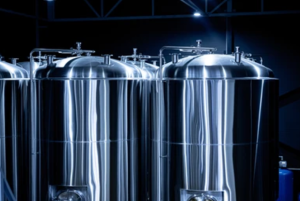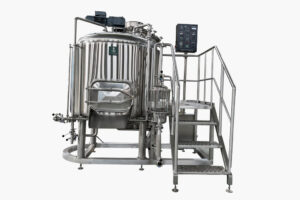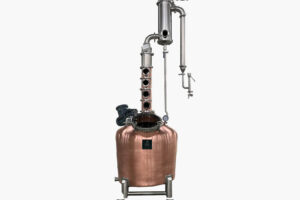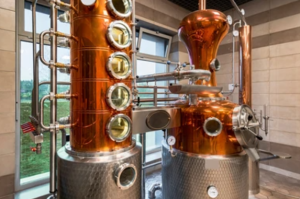COPYRIGHT © 2022 NingBo COFF Machinery Co., ltd. ALL RIGHTS RESERVED
Menu
Categories
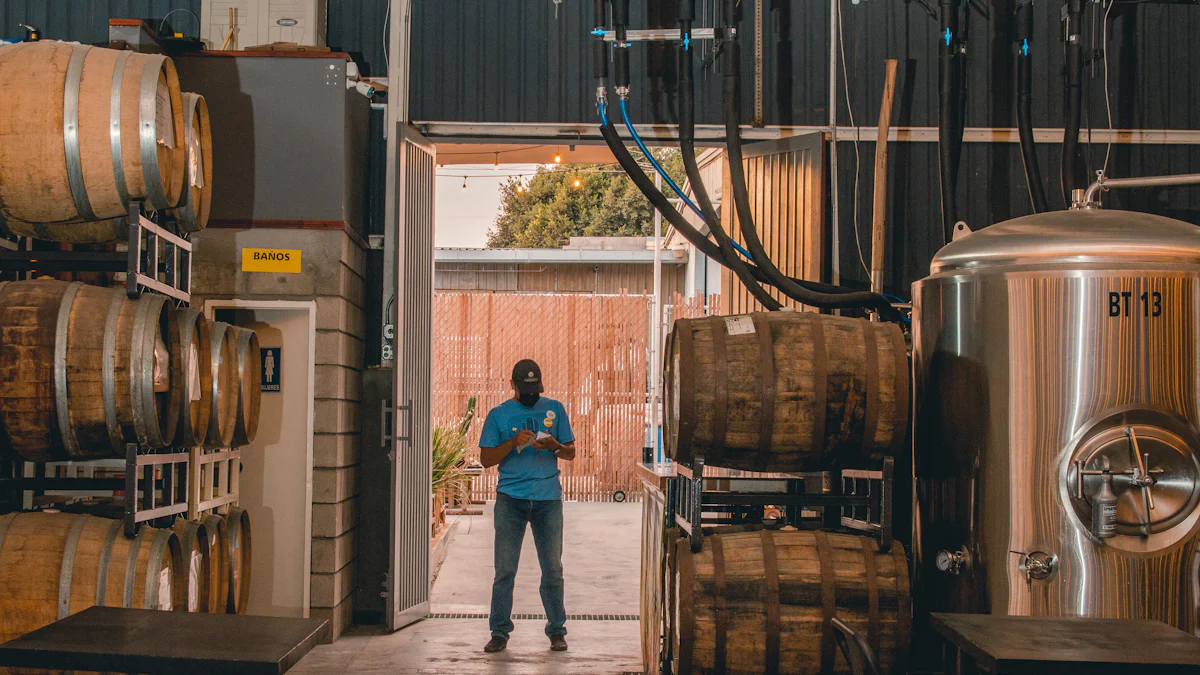
Choosing the right brewery hardware plays a crucial role in your homebrewing success. The equipment you select directly impacts the quality and consistency of your brew. Proper tools, like glass or plastic carboys for fermentation, ensure a smooth brewing process. As you embark on this journey, consider your brewing goals. Whether you’re brewing for personal enjoyment or aiming for competitions, aligning your equipment with your objectives is essential. With the right setup, you can transform your brewing experience and achieve remarkable results.
Key Takeaways
- Selecting the right brewery hardware is crucial for achieving high-quality and consistent homebrews.
- Beginner homebrewers should start with a basic homebrewing kit that includes essential tools like a brewing kettle, fermenter, and thermometer.
- As you gain experience, consider upgrading to larger kettles and advanced fermentation vessels to enhance your brewing capabilities.
- Investing in a wort chiller is essential for rapidly cooling your wort, preventing contamination, and ensuring clarity in your beer.
- Building or customizing your own brewing equipment can be a rewarding way to tailor your setup to your specific brewing style and needs.
- Regular maintenance of your brewing equipment, including cleaning and inspecting for wear, is vital for ensuring longevity and efficiency.
- Align your equipment choices with your brewing goals, whether for personal enjoyment or competition, to create a setup that supports your ambitions.
Essential Brewery Hardware for Beginners
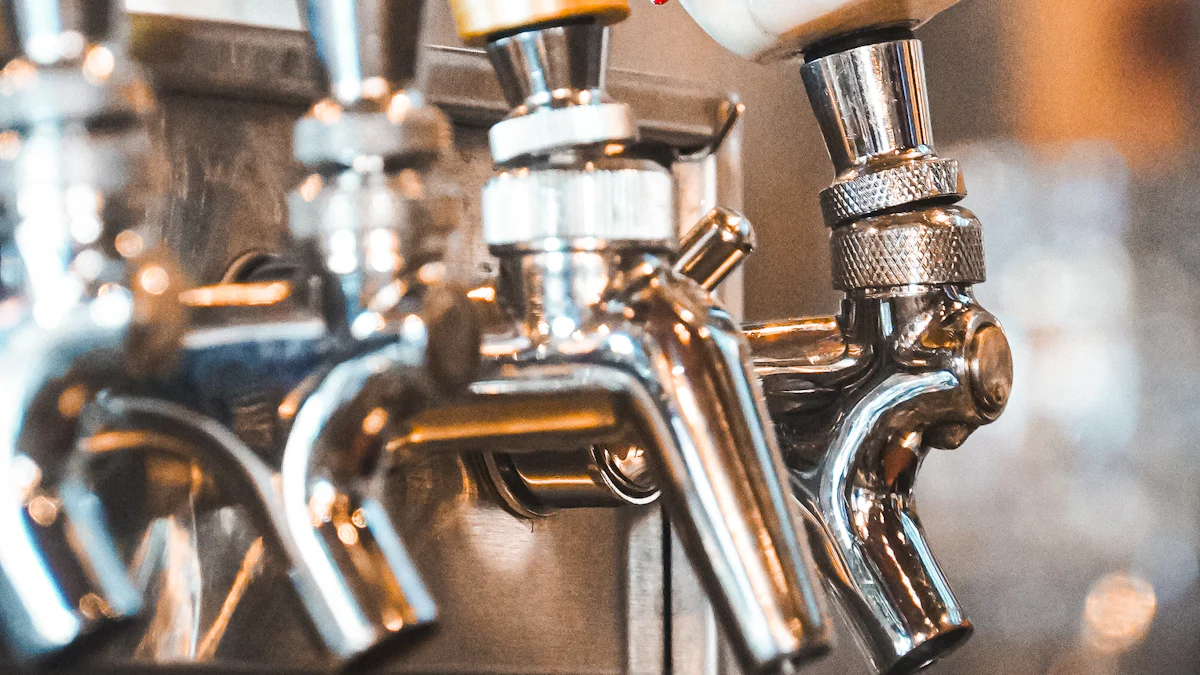
Embarking on your homebrewing journey requires the right tools to ensure a successful start. As a beginner, selecting the appropriate brewery hardware can make all the difference in your brewing experience. Let’s explore the essential equipment you need to get started.
Basic Homebrewing Kits
A Basic Homebrewing Kit serves as the foundation for any aspiring brewer. These kits typically include everything you need to brew your first batch of beer. Here’s what you can expect to find:
- Brewing Kettle: A large pot, usually at least 5 gallons, is essential for boiling your ingredients.
- Fermenter: This is where the magic happens. A 6.5-gallon fermenter with an airlock allows for proper fermentation, letting gases escape while keeping contaminants out.
- Long Stirring Spoon: Necessary for mixing ingredients thoroughly during the brewing process.
- Thermometer: Ensures you maintain the correct temperature, crucial for yeast activity.
- Bottle Capper and Caps: These tools help you seal your bottles once your beer is ready.
- Auto-Siphon with Tubing: Facilitates the transfer of beer from one container to another without disturbing sediment.
These kits provide a comprehensive set of tools to guide you through your initial brewing attempts. They simplify the process, allowing you to focus on learning the basics of homebrewing.
Choosing the Right Fermentation Vessels
Selecting the right fermentation vessel is crucial for achieving the desired flavor and quality in your beer. Most homebrewers use glass or plastic carboys, which come in various sizes, typically ranging from one to six gallons. Here are some options to consider:
- Glass Carboys: These are popular due to their non-reactive nature, ensuring no unwanted flavors are imparted to your beer. They are also easy to clean and allow you to monitor the fermentation process visually.
- Plastic Carboys: Lightweight and less prone to breakage, plastic carboys offer a practical alternative. They are also easier to handle and transport.
- Fermentation Buckets: Often included in starter kits, these buckets are simple to use and clean. They are ideal for beginners who want a straightforward fermentation process.
When choosing your fermentation vessel, consider the style of beer you plan to brew and the volume you wish to produce. Each type of vessel has its advantages, so select one that aligns with your brewing goals.
By investing in the right homebrew equipment, you set yourself up for success in your homebrewing endeavors. With the basics covered, you can focus on honing your skills and experimenting with different recipes.
Intermediate Home Brewery Setup
As you advance in your homebrewing journey, upgrading your home brewery setup becomes essential. This stage involves refining your equipment to enhance the quality and efficiency of your brewing process. Let’s explore how you can elevate your brewing system and select the best wort chiller for your needs.
Upgrading Your Brewing System
Upgrading your brewing system is a pivotal step in your homebrewing evolution. As you gain experience, you may find that your initial setup no longer meets your brewing ambitions. Here are some key upgrades to consider:
Larger Brewing Kettle: A larger kettle allows you to brew bigger batches, giving you more beer to enjoy or share. Look for kettles with built-in thermometers and volume markers for added convenience.
Advanced Fermentation Vessels: Consider upgrading to stainless steel fermenters. They offer durability and better temperature control, which can significantly improve your beer’s flavor profile.
Automated Systems: Automated brewing systems can streamline your process, reducing manual labor and increasing consistency. These systems often include programmable features for precise temperature and timing control.
By investing in these upgrades, you can enhance your home brewery setup, making it more efficient and capable of producing high-quality brews.
Selecting the Best Wort Chiller
A wort chiller is an essential component of any intermediate home brewery setup. It rapidly cools the wort after boiling, which is crucial for preventing contamination and achieving the desired beer clarity. There are several types of wort chillers to consider:
Immersion Chillers: These are simple to use and involve submerging a coil in the hot wort. Cold water runs through the coil, cooling the wort. They are affordable and effective for small to medium batches.
Counterflow Chillers: These chillers offer faster cooling by running hot wort through a narrow tube while cold water flows in the opposite direction through a surrounding tube. They reduce the wort’s exposure to airborne contaminants and improve cold break, making them ideal for larger batches.
Plate Chillers: These compact devices use a series of plates to cool the wort quickly. They are efficient and save water, but require thorough cleaning to prevent clogging.
Choosing the right wort chiller depends on your batch size and brewing frequency. Counterflow chillers are excellent for those looking to improve efficiency and reduce water usage, while immersion chillers are perfect for beginners seeking simplicity.
By upgrading your brewing system and selecting the appropriate wort chiller, you can take your homebrewing to the next level. These enhancements will not only improve the quality of your beer but also make the brewing process more enjoyable and rewarding.
Advanced Homebrewing Equipment
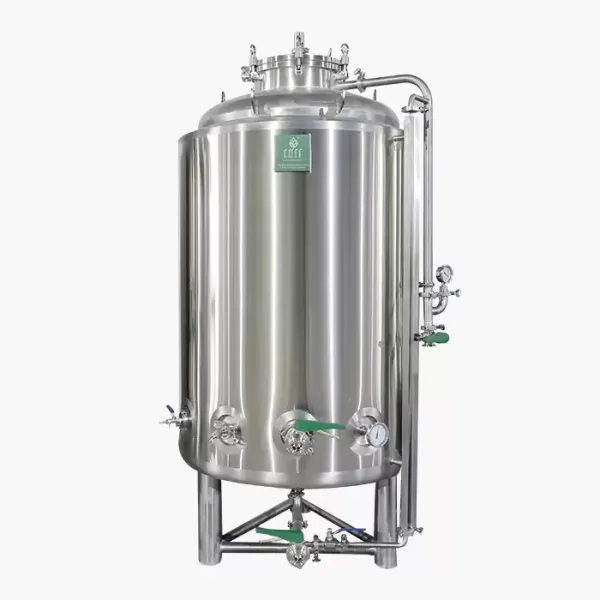
As you delve deeper into the world of homebrewing, investing in advanced brewery hardware can significantly enhance your brewing capabilities. This equipment allows you to experiment with more complex brewing techniques and achieve professional-quality results.
All-Grain Brewing Systems
Transitioning to an all-grain brewing system marks a significant milestone in your homebrewing journey. This setup gives you complete control over the brewing process, allowing you to craft beers with unique flavors and characteristics. Here’s what you need to know about all-grain systems:
Mash Tun: A mash tun is essential for converting starches into sugars. It typically includes a false bottom or manifold to separate the liquid wort from the grain.
Hot Liquor Tank: This tank heats the water used in the mashing and sparging processes. Consistent temperature control is crucial for extracting the right flavors from the grains.
Boil Kettle: A larger boil kettle is necessary for all-grain brewing. It accommodates the increased volume of wort produced during the mashing process.
All-grain brewing systems offer unparalleled flexibility and creativity. You can experiment with different grain combinations and brewing techniques to create truly unique beers.
Kegerators and Draft Systems
Kegerators and draft systems elevate your homebrewing experience by providing a convenient and professional way to serve your beer. These systems offer several advantages:
Efficiency: Kegging your beer saves time and effort. You only need to clean and sanitize one container instead of multiple bottles. This efficiency allows you to focus more on brewing and less on bottling.
Versatility: Draft systems can double as lagering or conditioning tanks. This versatility makes them a valuable addition to any homebrew setup. As Alison Calandra, an avid home brewer, notes, “The time-saving aspects of a keg system and its versatility are among the reasons for putting a draft beer system at the top of my wish list.”
Quality: Serving beer from a draft system enhances its freshness and flavor. You can enjoy your brew at its best, just like at a professional brewery.
Investing in a kegerator or draft system not only improves the quality of your beer but also enhances your overall brewing experience. These systems provide a seamless way to enjoy your creations and share them with others.
DIY Options for Homebrewing
Exploring DIY options in homebrewing can be both rewarding and cost-effective. By taking a hands-on approach, you can customize your brewing setup to suit your specific needs and preferences. Let’s delve into how you can build it yourself and customize existing equipment to enhance your brewing experience.
Building Your Own Brewery Hardware
Building your own brewery hardware offers a unique opportunity to tailor your setup to your brewing style. This approach not only saves money but also provides a deeper understanding of the brewing process. Here are some steps to get you started:
Research and Plan: Begin by researching the components you need. Consider the size of your batches and the type of beer you want to brew. Planning ensures you gather the right materials and tools.
Gather Materials: Collect materials like stainless steel or food-grade plastic. These materials are essential for constructing durable and safe brewing equipment.
Assemble Your Equipment: Follow detailed guides or tutorials to assemble your equipment. Whether it’s a mash tun or a fermentation vessel, ensure each component is securely fitted.
Test and Adjust: Once assembled, test your equipment with a small batch. This step helps identify any adjustments needed for optimal performance.
Building your own hardware fosters a sense of accomplishment and allows you to brew it yourself with pride. As one homebrewer noted, documenting the process can lead to consistently better beer.
Customizing Existing Equipment
Customizing existing equipment is another effective way to enhance your homebrewing setup. By making modifications, you can improve efficiency and adapt your equipment to new brewing techniques. Consider these customization ideas:
Upgrade Components: Replace standard parts with high-quality alternatives. For example, swap out plastic fittings for stainless steel to improve durability and hygiene.
Add Features: Incorporate additional features like temperature controllers or sight glasses. These enhancements provide better control over the brewing process and allow for precise adjustments.
Optimize Layout: Rearrange your brewing area for better workflow. An efficient layout minimizes movement and reduces brewing time, making the process smoother.
Personalize Aesthetics: Customize the appearance of your equipment. A personalized setup not only looks appealing but also reflects your brewing identity.
By customizing your equipment, you can create a brewing environment that aligns with your goals and preferences. This approach encourages continuous improvement and innovation in your homebrewing journey.
Choosing Equipment Based on Brewing Goals
Selecting the right equipment for your homebrewing journey hinges on your brewing goals. Whether you brew for personal enjoyment or aim to compete, your objectives will shape your equipment choices. Let’s explore how to align your setup with your aspirations.
Brewing for Personal Enjoyment
When brewing for personal enjoyment, focus on creating a brew day setup that enhances your experience. Here are some considerations:
Batch Size: Opt for equipment that suits smaller batches. This allows you to experiment with different recipes without committing to large quantities.
Simplicity: Choose user-friendly tools. A straightforward brewing process ensures you spend more time enjoying your hobby and less time troubleshooting equipment.
Customization: Personalize your setup. Add features that reflect your style, such as custom labels or unique bottle designs.
Quality Ingredients: Invest in high-quality ingredients. Fresh malt, hops, and yeast contribute significantly to the flavor and aroma of your beer.
Brewing for personal enjoyment means prioritizing the pleasure of the process and the satisfaction of crafting a beer that suits your taste.
Brewing for Competitions
If you aim to compete, your equipment choices should support precision and consistency. Consider these factors:
Advanced Systems: Invest in advanced brewing systems. Automated systems offer precise control over temperature and timing, crucial for producing competition-worthy beer.
Wort Clarity: Focus on achieving clear wort. Use a high-quality wort chiller to rapidly cool your brew, minimizing the risk of contamination and ensuring clarity.
Consistency: Ensure consistent results. Use equipment that allows you to replicate successful batches, maintaining the quality needed for competitions.
Documentation: Keep detailed records of your brewing process. Documenting each step helps refine your technique and improve future brews.
Brewing for competitions requires a commitment to excellence. Your equipment should empower you to produce beer that stands out in a competitive field.
By aligning your equipment with your brewing goals, you create a setup that supports your ambitions, whether for personal satisfaction or competitive success. COFF offers a range of brewery hardware designed to meet diverse needs, ensuring you have the right tools for your brewing journey.
Maintenance and Upgrading Brewery Hardware
Maintaining your brewery hardware is crucial for ensuring the longevity and efficiency of your homebrewing setup. Regular upkeep not only preserves the quality of your equipment but also enhances the overall brewing experience. Let’s explore some essential maintenance tips and identify when it’s time to upgrade your equipment.
Regular Maintenance Tips
Clean After Every Use: Always clean your brewing equipment immediately after use. Residue from brewing can lead to contamination and affect the taste of future batches. Use a mild detergent and warm water to clean all surfaces thoroughly.
Inspect for Wear and Tear: Regularly check your equipment for signs of wear and tear. Look for cracks, rust, or any damage that might compromise the brewing process. Early detection can prevent more significant issues down the line.
Sanitize Before Brewing: Sanitation is key in homebrewing. Before each brewing session, sanitize all equipment that will come into contact with your beer. This step helps prevent unwanted bacteria and ensures a clean brew.
Lubricate Moving Parts: If your setup includes moving parts, such as pumps or valves, ensure they are well-lubricated. This practice reduces friction and extends the life of your equipment.
Store Properly: After cleaning and drying, store your equipment in a dry, cool place. Proper storage prevents mold growth and keeps your tools in optimal condition.
Join a Brew Club: Engaging with experienced brewers can provide valuable insights into maintaining your equipment. As Teri Fahrendorf suggests, joining a brew club can offer support and advice on best practices.
When to Upgrade Your Equipment
Increased Brewing Volume: If you find yourself brewing larger batches more frequently, it might be time to upgrade to bigger equipment. Larger kettles and fermenters can accommodate increased volumes, making your brewing process more efficient.
Advanced Brewing Techniques: As you gain experience, you may want to explore advanced brewing techniques like all-grain brewing. Upgrading to an all-grain system can provide more control over the brewing process and enhance the quality of your beer.
Improved Efficiency: Consider upgrading if your current setup is inefficient or time-consuming. Automated systems or advanced wort chillers can streamline your process, saving you time and effort.
Quality Enhancement: If you’re aiming for higher quality brews, investing in stainless steel fermenters or kegerators can significantly improve your beer’s flavor and freshness.
Outdated Equipment: Over time, equipment can become outdated or less effective. If repairs become frequent or costly, it may be more economical to invest in new, modern equipment.
Feedback from Peers: Engaging with fellow brewers can provide insights into when an upgrade is necessary. Experienced brewers can offer recommendations based on their own experiences and successes.
By maintaining your equipment and knowing when to upgrade, you ensure a smooth and enjoyable homebrewing journey. COFF offers a range of high-quality brewery hardware designed to meet the evolving needs of homebrewers, ensuring you have the right tools for every stage of your brewing adventure.
Promoting COFF’s Brewing Solutions
COFF’s Range of Brewery Hardware
When you embark on your homebrewing journey, selecting the right equipment is crucial. COFF offers a comprehensive range of brewery hardware designed to meet the needs of both novice and experienced brewers. Their products are crafted with precision and quality, ensuring you achieve the best results in your brewing endeavors.
Brewing Kettles: COFF provides kettles in various sizes, perfect for any batch size you plan to brew. These kettles come with built-in thermometers and volume markers, making the brewing process more efficient and precise.
Fermentation Vessels: Choose from a selection of glass, plastic, or stainless steel fermenters. Each type offers unique benefits, allowing you to select the one that best suits your brewing style and goals.
Wort Chillers: COFF’s wort chillers are designed to rapidly cool your wort, preventing contamination and ensuring clarity. Whether you prefer immersion, counterflow, or plate chillers, COFF has options to fit your needs.
Kegerators and Draft Systems: For those looking to elevate their homebrewing experience, COFF offers kegerators and draft systems that provide a professional way to serve your beer. These systems enhance the freshness and flavor of your brew.
Explore COFF’s full range of brewery hardware on their website: COFF Brewing. With COFF, you can trust that you’re investing in high-quality equipment that will support your brewing journey.
Customer Testimonials and Success Stories
Hearing from other brewers can provide valuable insights into the effectiveness of COFF’s brewery hardware. Many customers have shared their success stories, highlighting how COFF’s equipment has transformed their brewing experiences.
“Switching to COFF’s stainless steel fermenters was a game-changer for me. The temperature control and durability have significantly improved the quality of my beer.” – John D., Homebrewer
“The automated brewing system from COFF has streamlined my process. I spend less time on manual tasks and more time enjoying the brewing experience.” – Sarah L., Craft Beer Enthusiast
“COFF’s customer service is exceptional. They helped me choose the right equipment for my needs and provided support throughout the setup process.” – Mike R., Aspiring Brewer
These testimonials reflect the positive impact COFF’s products have on homebrewers worldwide. By choosing COFF, you join a community of satisfied brewers who have elevated their craft with reliable and innovative equipment.
FAQs
Embarking on your homebrewing journey can raise many questions. Here, we address some of the most frequently asked questions to help you brew with confidence.
What is the best equipment for a beginner homebrewer?
You should start with a basic homebrewing kit. This kit usually includes a brewing kettle, fermenter, airlock, thermometer, and sanitizer. These essentials will guide you through your first brewing experience.
How do I choose the right fermentation vessel?
Consider the style of beer you want to brew. Glass carboys are great for visual monitoring, while plastic ones are lightweight and durable. Fermentation buckets offer simplicity and ease of use.
When should I upgrade my brewing equipment?
Upgrade when your brewing goals expand. If you want to brew larger batches or try advanced techniques like all-grain brewing, consider investing in larger kettles or automated systems.
What is the purpose of a wort chiller?
A wort chiller rapidly cools your wort after boiling. This step is crucial to prevent contamination and achieve clear beer. Choose between immersion, counterflow, or plate chillers based on your batch size and efficiency needs.
How can I maintain my brewery hardware?
Clean your equipment after each use with mild detergent and warm water. Regularly inspect for wear and tear, sanitize before brewing, and store in a dry, cool place to ensure longevity.
What are the benefits of using a kegerator?
Kegerators save time by reducing bottling efforts. They enhance beer freshness and flavor, providing a professional serving experience at home.
Can I build my own brewing equipment?
Yes, building your own equipment can be cost-effective and rewarding. Research, plan, and gather materials like stainless steel or food-grade plastic to customize your setup.
Why should I choose COFF’s brewing solutions?
COFF offers high-quality brewery hardware tailored to both novice and experienced brewers. Their products ensure precision and quality, supporting your brewing journey with reliable and innovative equipment.
We get asked a lot of questions, so we have put together this list of frequently asked brewing questions. Hopefully, this should answer your questions, but if not, feel free to message us, and we’ll be happy to answer any questions you may have.
If you have more questions, feel free to reach out. We’re here to help you succeed in your homebrewing adventure!
Selecting the right brewery hardware is vital for your homebrewing success. Your equipment choices should align with your brewing goals and budget. Whether you’re crafting small batches for personal enjoyment or aiming for larger production, your setup should reflect these objectives. Exploring DIY options can offer cost-effective solutions and customization opportunities. As your skills advance, upgrading your equipment becomes essential to enhance efficiency and quality. By making informed decisions, you ensure a rewarding brewing journey that evolves with your expertise.

